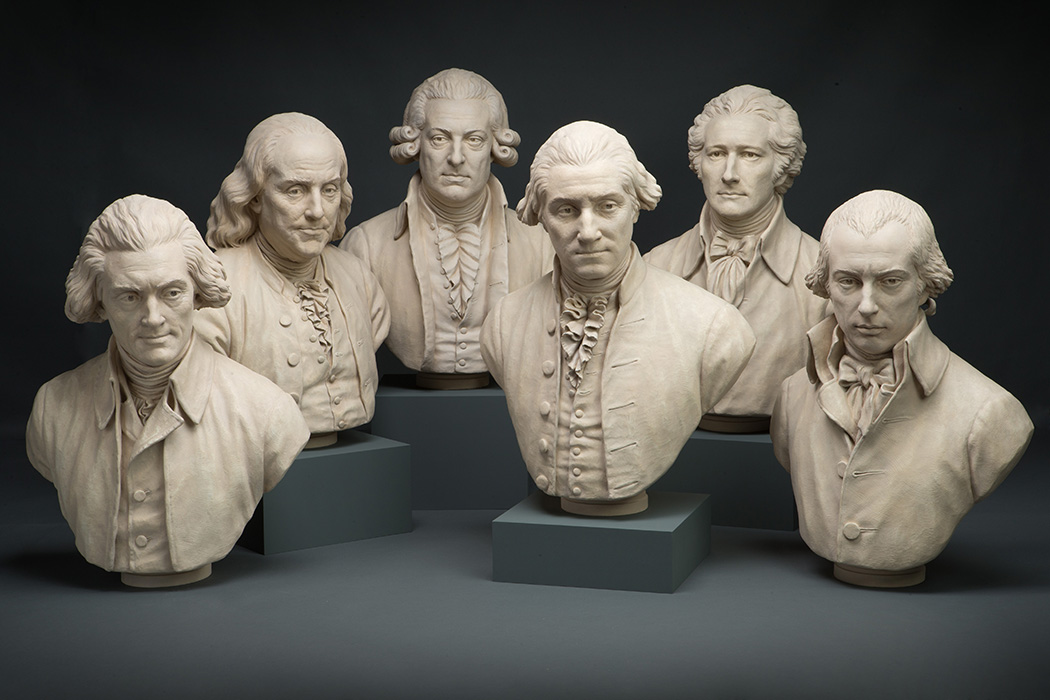 |
Craig White's Literature Courses Historical Backgrounds
More than two centuries later, by Mario Recio McClatchy News Bureau, 27 Sept. 2013 |
 At the new Washington Library, busts of Washington (center) and his compatriots as they appeared in the 1780s: (l-r) John Adams, Benjamin Franklin, Alexander Hamilton, Thomas Jefferson, and James Madison |
MOUNT VERNON, Va. — George Washington’s majestic estate overlooking the Potomac River now has an added attraction: a state-of-the-art presidential library.
The grand opening Friday of the Fred W. Smith National Library for the Study of George Washington celebrated the father of our country with a festive crowd that included both U.S. senators from Virginia, the governor, performances by country singers – and couple – Vince Gill and Amy Grant, and a keynote by Pulitzer Prize-winning historian David McCullough.
The library was designed to add a scholarly element to the understanding of the first president, who had written in a letter to a friend in 1797 that he wanted a building on his property to house his papers.
“If there’s anybody who deserves a presidential library, it’s Washington,” said historian Stephen Knott, professor of national security affairs at the U.S. Naval War College in Newport, R.I., who has studied the Founding Fathers. “He was our greatest president. This is 220 years overdue.”
The Mount Vernon Ladies’ Association, a private group that has owned and operated the estate since 1858, raised $106 million in private funds for the library over the last three years. Philanthropist Fred W. Smith, chairman of the Donald W. Reynolds Foundation, was a leader of the effort. The foundation contributed $38 million for the library in 2010.
“This new library will help us to maintain and advance George Washington’s timeless relevance in our fast-changing world,” said Ann Bookout, regent of the Mount Vernon Ladies’ Association.
Washington is most famous as a man of action, a leader and landowner. But he also had a deep love of learning. He was largely self-taught, eventually mastering the art of surveying, his profession before joining the military. As restive colonists rose up against the British, Washington became the commander of the Continental Army, and after he led the revolutionary forces to victory, a national hero.
As the Founding Fathers debated the new government, it was Washington who declined any overture to be king. He supported the American experiment in democracy.
The new library owns 62 titles, or 103 volumes, of Washington’s original 1,200 titles, as well as duplicates of books that are known to have been in his collection.
They are all stored in a secure oval room that is temperature- and light-protected. His books can only be handled by library staff, which will bring volumes to scholars seated at tables in another secure anteroom where his manuscripts and correspondence are stored.
Among the original books: “The Iliad,” by Homer; “The Federalist,” by Alexander Hamilton, James Madison and John Jay; “Common Sense,” by Thomas Paine; and a recently acquired prize possession, Washington’s personal copy of the Acts of Congress, which includes the Constitution, with the Bill of Rights annotated with Washington’s notes in the margins. The acts, bought at auction last year for $9.8 million, just finished a tour of all the official presidential libraries.
There is also a four-volume “Don Quixote,” by Miguel de Cervantes, a gift from the Spanish court. The leather-bound, illustrated set is written in Spanish, which Washington did not know, and it does not appear to show its age.
“This library has the potential to trump all presidential libraries as Washington’s impact on the history and character of the United States is greater than that of any president, and perhaps any single historical figure,” said founding director Douglas Bradburn.
The new library is very much in line with presidential libraries for more recent presidents, such as the George W. Bush Presidential Center in Dallas, which opened in April and includes a library and museum. However, Washington’s library is private, unlike the network of 13 modern presidential libraries, starting with Franklin Delano Roosevelt’s, which are operated by the National Archives and Records Administration. State historical societies also run several presidential libraries, including Abraham Lincoln’s in Springfield, Ill.
Washington’s library, a large airy structure built in the woods across the street from his Mount Vernon residence, will be, like all the “official” presidential libraries, a center for study, research and conferences.
“It will play the role of the presidential library,” said Mount Vernon spokeswoman Melissa Wood.
With 45,000 square feet of space and built on a 15-acre plot, the library brings together for the first time Washington’s books, correspondence, even his ledgers for running the estate, as well as valuable historical documents of the nation’s founding.
The mission-style two-story stone exterior features large windows bordered by mahogany, giving the building an open feeling that blends with the wooded lot.
Inside, the two-story, light-splashed reading room is trimmed with wood from a 300-year old American sycamore tree – a detail that Bradburn really likes.
“It was alive at the same time as Washington,” he said.
Imposing busts of Hamilton, Madison, Benjamin Franklin, Thomas Jefferson, John Adams and Washington sit perched on the walls.
The attraction will not be part of the regular Mount Vernon tour, a mainstay of Washington sightseeing. Students and other researchers of the era will have access to the facility but on a pre-arranged basis, said Wood. Resident fellowships for researchers and teachers will begin this year. They will be housed in a new building on the campus.
![]()